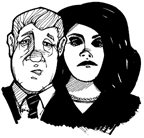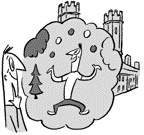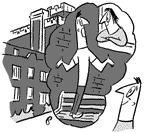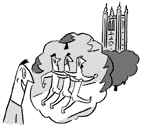
As the obligatory "So, how was your summer?" faded like so many tan lines with the start of classes, another question began to spark those brief, flitting, sometimes awkward conversations between last spring's precept commissaries: "So, what do you think about Clinton?" Whether the conversation centered around the sordid details or around the common sentiment of being fed up with the whole story, it was close to impossible to find a student who had nothing to say about it.
Students settling into their seats in Robertson Hall for their first lecture in "Quantitative Analysis and Public Policy" were comparing notes on the televised Clinton testimony, which they'd reluctantly had to turn off in order to go to class. Animated gesticulation and over-authoritative speculation about the downfall of a President had subsumed the casual first-week banter about course-change forms and long lines at the Registrar's office. Granted, the students in this course -- which is a requirement for Woodrow Wilson School majors -- are not a representative sample of all Princeton students, many of whom seem to regard politics as an invasion of Princeton's Gothic "bubble." P.J. Kim, a Class of 2001 Senator, is often called upon to speak for fellow students on political issues. "People tend to think we think more about these issues because it's Princeton," he says. "But in general, students here are pretty apathetic."
It's not 1973
Indeed, the mood on campus this fall has been decidedly different than Brad Swanson '76 described it in this column in November 1973, at the height of the Watergate crisis: "For a while it seemed as though student activism had returned to Princeton. Mass meetings were held to denounce President Nixon. Tables were set up outside Firestone Library and Commons where telegrams could be written to congressmen. One group considered pro-impeachment demonstrations."
If anything, Princeton has behaved like a miniature America during this crisis. Bombarded by bewildering legalese and nauseating details, students are struggling to decide how to deal with the issue. Some change the channel whenever the pundits appear, while others are inspired to debate and discussion by the day's PG-13 headlines. Unlike the political crisis of our parents, generation, "Monicagate" has inspired a quieter, subtler introspection. And despite the absence of Presidential effigies hanging from Nassau Hall, undercurrents of a political identity crisis are evident.
"I'm sick of hearing about it," said sophomore Lauren Hofman. "We don't need to hear so many details." Although she has talked about the Presidential crisis at home with her family, she usually avoids the topic with fellow students. "People have such salient opinions, that it usually turns into a heated discussion."
Jessica Rebel '00, a resident adviser in Forbes College, campaigned for Bill Clinton in 1996 and continues to stand by the President. "I don't think the question should have been asked in the first place. When someone's back is against the wall and they're questioned about their sex life, it's understandable to lie." When asked if she blames an overaggressive media for exaggerating the story, Rebel looks instead to a hypocritical public. "People say the story needs to go away, but they still pay attention. As long as people read about it, the media will report it."
The press as perpetrators
But Dok Harris '01, who also worked on the Clinton campaign in '92 and '96, sees the press as greater perpetrators. "It's been a forcefeed by the media, constantly telling us 'You care, you care.' " Harris sees the Bill-Monica soap opera as almost a nonstory, citing the fact that "half of Americans have had affairs, and they would handle the situation the same way."
Kim, also a member of the College Republicans, thinks the President should resign. "Regardless of whether he had an affair or not, he lied to a lot of people, and now he's in a position where he can't carry out his duties. In many ways, that,s not totally his fault," he concedes. "But in my opinion, there's a lot of other news the country should be focusing on, but isn't."
Ana Hey-Colon continues to ask herself and others why Americans are so obsessed with the Monica story. The freshman from Puerto Rico recalls that when the topic suddenly became the focal point of her freshman seminar, "Privacy in the Age of Information Technology," she and other international students did not "get heated up" like the Americans. "We just don't care that much, and kind of looked at each other across the table."
"It's disgraceful for the whole country," agrees Hofman. And Rebel, who spent the summer taking courses at the Goethe Institut in Germany, recalls discussing the story in class the day that Clinton was called to testify. "There were students there from all over the world," she explains. "People were taking about it -- but mostly just the Americans. The other students were kind of wondering what the big fuss was about."
Blair courtyard evokes images of another time--a good three years ago
by Daniel A. Grech '99
 I just
started my senior year, and I'm already beginning
to miss Princeton. Even worse, I'm starting to feel
old. I can buy liquor with my real I.D. I can't
stay up all night anymore. My back sometimes hurts in the morning. I have to shave at least
three times a week.
I just
started my senior year, and I'm already beginning
to miss Princeton. Even worse, I'm starting to feel
old. I can buy liquor with my real I.D. I can't
stay up all night anymore. My back sometimes hurts in the morning. I have to shave at least
three times a week.

